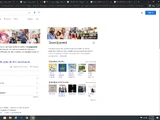Template:IndexTrope
Really just a series of tubes. [1]
"The Internet is a communications tool used the world over where people can come together to bitch about movies and share pornography."
|
The entire reason All The Tropes can exist! The Internet is a massive group of interconnected computers world-wide (including yours!) that allows users to send/receive various types of information, usually hypertext documents (via HTTP). This technology has revolutionized all forms of media communication, from television and film to picking up your groceries. It's hard to find a business, industry, or art form that is not reliant on The Internet in one form or another.
Originally conceived as a way for the United States military to connect its distinct computer networks, The Internet was ultimately made public in the 1990s. In the United States, nearly all consumers access the internet through one of several major providers (called ISPs), who charge a small fee for a prescribed level of access, called bandwidth. Outside of the United States, private companies still control most access to the Internet, but some countries have mandated free, public Internet access for use by the general population.
Commonly used in virtually every medium on All The Tropes, the Internet has become a cultural icon, representing a new era of interconnected social media and technological advancement.
It can also be very very frightening.
See also: Trope Namers/Internet.
All items (36)





